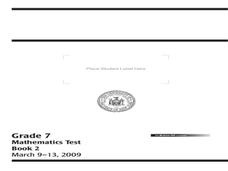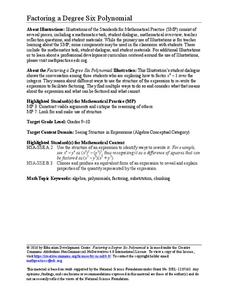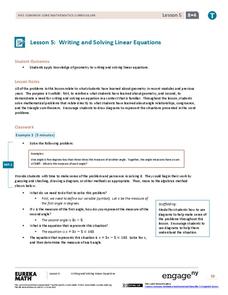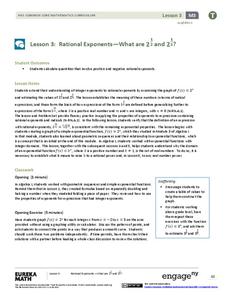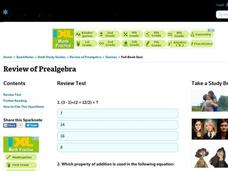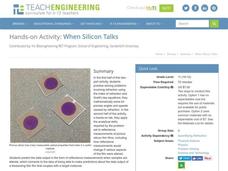Curated OER
Brothers and Sisters
In this secondary mathematics activity, students solve a riddle/word problem involving the number of brother and sisters in a family. The one page activity contains one problem with the solution.
Curated OER
Hen and a Half
In this secondary mathematics worksheet, students solve a riddle/word problem involving a hen and a half laying an egg and a half. The one page worksheet contains one problem with the solution.
Curated OER
Orthodontist
In this secondary mathematics worksheet, high schoolers solve a word problem involving rate, time, and distance. The one page worksheet contains one problem with the solution.
Curated OER
Mike's Age
In this secondary mathematics worksheet, students solve a word problem revolving around Mike’s age. The one page worksheet contains one problem with the solution.
Curated OER
NY State Testting Program
In this algebra worksheet, 7th graders review and practice core concepts for their 7th grade exam. They review geometry, algebra and solving word problems. This assignments contains a booklet of worksheets.
National Security Agency
Are You Game? A Lesson Connecting Fractions and Probability
Exactly how fair are the board games children grow up playing? Young mathematicians investigate this questions as they work their way through this five-lesson series on basic probability.
Education Development Center
Factoring a Degree Six Polynomial
Within collaborative groups, scholars factor a degree six polynomial. They can factor the polynomial using many different strategies — a great way to prompt mathematical discussion.
California Education Partners
John's Trip Disneyland
It all adds up to one. Pupils solve several items that involve finding sums of fractions in relationship to a whole. The assessment task uses fractions with unlike denominators to determine the amount of a tank of gas and the amount of...
EngageNY
Interpreting and Computing Division of a Fraction by a Fraction—More Models II
No more inverting and multiplying to divide fractions. Applying concepts of measurement division from the previous lesson plan, pupils consider partitive division using fraction bars and number lines. They first convert fractions to like...
EngageNY
Comparing Quadratic, Square Root, and Cube Root Functions Represented in Different Ways
Need a real scenario to compare functions? This lesson has it all! Through application, individuals model using different types of functions. They analyze each in terms of the context using the key features of the graphs.
EngageNY
Writing and Solving Linear Equations
Incorporate geometry into the solving linear equations activity. Pupils use their knowledge of geometry to write linear equations which reinforces geometry measurement concepts while at the same time providing a familiar context for...
Virginia Department of Education
Translate and Evaluate
Translate, evaluate, educate. Discover how to translate and evaluate expressions. Young mathematicians first review words and phrases that indicate operations and learn to write algebraic expressions from verbal descriptions....
EngageNY
Rational Exponents—What are 2^1/2 and 2^1/3?
Are you rooting for your high schoolers to learn about rational exponents? In the third installment of a 35-part module, pupils first learn the meaning of 2^(1/n) by estimating values on the graph of y = 2^x and by using algebraic...
PBS
Garden Grade 6 Area and Perimeter
Engage young mathematicians in applying their knowledge of area and perimeter with a fun geometry lesson. Through a series of problem solving exercises, children use their math knowledge to design different-sized garden plots that meet...
Buffalo State
Adding and Subtracting Positive and Negative Integers
A well-rounded unit on positive and negative integers is a great addition to your middle school math class. Learners work through five activities, each focused on a different skill, before playing a Game of Life to practice the...
University of Georgia
Using Freezing-Point Depression to Find Molecular Weight
Explore the mathematical relationship between a solvent and solute. Learners use technology to measure the cooling patterns of a solvent with varying concentrations of solute. Through an analysis of the data, pupils realize that the rate...
National Security Agency
Partying with Proportions and Percents
Examine ratios and proportions in several real-world scenarios. Children will calculate unit rates, work with proportions and percentages as they plan a party, purchase produce, and take a tally. This lesson plan recommends five...
Curated OER
Review of Pre-Algebra
Middle and high schoolers review topics covered Pre-Algebra. They solve problems questions dealing with exponents, square roots and absolute value. They use the rules of divisibility and identify prime numbers. This two-page on-line...
Willow Tree
Order of Operations
It's the classic please excuse my dear aunt sally strategy to remembering the order of operations. Young mathematicians practice to develop an understanding of the order of operations. Examples and practice problems include absolute...
Teach Engineering
When Silicon Talks
Explore Snell's Law using thin films. In the fifth installment of a seven-part series, pupils solve a set of problems relating to Snell's Law and use this skill during an experiment requiring the collection of reflective measurements...
Curated OER
Solving Equations by Factoring
In this algebra activity, learners use the Zero Product Property to solve polynomial equations by factoring. Application problems are included. The one page interactive activity contains fifty-four problems. The solution steps and...
Virginia Department of Education
Exponential Modeling
Investigate exponential growth and decay. A set of six activities has pupils collecting and researching data in a variety of situations involving exponential relationships. They model these situations with exponential functions and solve...
National Council of Teachers of Mathematics
Tidal Waves
Periodically ship the class a trigonometric application. Pupils model the level of water in a port. Using their models, learners determine the times that a ship can safely navigate into and out of the port, along with determining other...
Alabama Learning Exchange
Mix it Up! Exploring the Commutative and Associative Properties of Addition
Examine commutative and associative properties with your class. They'll explore the relationships between addition and subtraction and investigate patterns as they solve addition problems. Links to an assessment and a table game are...






